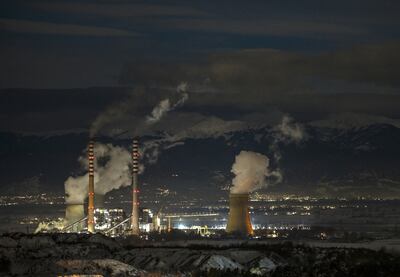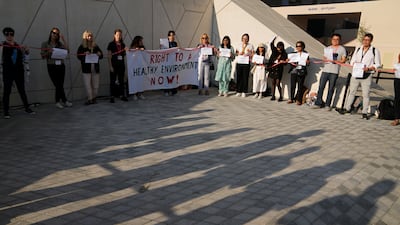Live updates: Follow the latest news on Cop28
Climate change talks in Dubai are focusing on a 31-word draft sentence that proposes a way forward on the contentious issues of fossil fuels.
A new draft of the global stocktake – the key text being agreed to at Cop28 – suggests reducing fossil fuel use in what would be the first such commitment at a global level.
The UAE’s Cop28 Presidency described the draft text as a “huge step forward” that reflects its ambitions for the summit.
But negotiations are set to stretch into the summit’s final hours as several key players push for tougher language, such as a “phase-out” of fossil fuels that had been on the table in an earlier draft.
The magic words in the draft are “reducing both consumption and production of fossil fuels in a just, orderly and equitable manner so as to achieve net zero by, before or around 2050 in keeping with the science”.
Breaking it down:
Reducing consumption and production of fossil fuels
This is a compromise, after early drafts of the stocktake showed countries were considering everything from a phase-out to no agreement at all.
“Reducing” fossil fuel use, but not necessarily to zero, is somewhere in the middle.
For many delegates, it does not go far enough, with small island states indicating that they will only sign a text with “strong commitments” on a phase-out.
EU countries also want tougher wording, with Germany saying “key elements” of the draft are unacceptable because they indicate that fossil fuels have a viable future.
Others see the proposal as a “phase-down” – the language agreed to on coal two years ago – by a less contentious name.
“This is historic text, which recognises for the first time in the outcome of a United Nations climate change summit that the production and consumption of fossil fuels need to be cut,” said Bob Ward of the Grantham Institute on climate change.
In a just, orderly and equitable manner
These words are similar to an early draft that proposed an “orderly and just phase-out”.
This is the sort of wording that tends to be insisted on by developing countries who say they cannot be expected to turn away from fossil fuels overnight.
It means they can reasonably balance the push to go green against the need to find money, contain the social impact and avoid worsening inequality.
Some campaigners want to see the text spell out more clearly how the transition will be managed, with Romain Ioualalen of Oil Change International saying it “must be significantly improved to align with science, finance needs, and equity”.

So as to achieve net zero by, before or around 2050
This refers to net-zero greenhouse gas emissions.
In other words, any carbon dioxide you still emit in 2050 should be balanced out by removing carbon from the atmosphere.
Focusing on the outcome leaves open different policy options to get there, with countries such as India typically opposing what they see as overly prescriptive language on fossil fuels.
“There will be some who argue that we should commit to end all fossil fuels, but it is important to remain focused on the driver of climate change, which is greenhouse gas emissions,” Mr Ward said.
In keeping with the science
The UN’s top panel on climate science estimates that hitting the world’s key goal of limiting the temperature rise to 1.5°C above pre-industrial levels would involve a 95 per cent reduction in coal use, 60 per cent for oil and 45 per cent for natural gas.
Wording on following “the science” only alludes to such findings, rather than setting them as concrete targets, but is generally welcomed by those pushing for an ambitious deal.


